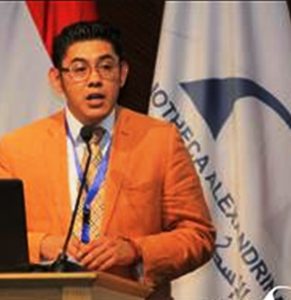Meet the CC Summit Presenter: Juan Miguel Palma Peña
jeudi 9 septembre 2021 à 16:12 Our ‘Meet the CC Summit Presenter’ series is taking us around the world — next stop: Mexico City. We recently caught up with Juan Miguel Palma Peña, a PhD holder in Library Science and Information Studies at the National Autonomous University of Mexico (UNAM). At UNAM, Juan works as a scholarly librarian in the Humanindex Scholarly Information System of the Humanities Coordination, and is also a professor of the Bachelor’s Degree in Librarianship and Information Studies of the Open University and Distance Education System. His research interests are: scholarly communication; open science; open access. Juan is also a national and international speaker. He has spoken at over 60 academic events in Mexico, the United States of America, Romania, Greece, Malaysia, Egypt and Portugal, among other countries. Juan is an Elected Member of the Standing Committee of the Serials and Other Continuous Resources Section (SOCRS) of the International Federation of Library Associations and Libraries (IFLA). He’s also a member of the Metadata Schema Commission of Institutional Repository UNAM.
Our ‘Meet the CC Summit Presenter’ series is taking us around the world — next stop: Mexico City. We recently caught up with Juan Miguel Palma Peña, a PhD holder in Library Science and Information Studies at the National Autonomous University of Mexico (UNAM). At UNAM, Juan works as a scholarly librarian in the Humanindex Scholarly Information System of the Humanities Coordination, and is also a professor of the Bachelor’s Degree in Librarianship and Information Studies of the Open University and Distance Education System. His research interests are: scholarly communication; open science; open access. Juan is also a national and international speaker. He has spoken at over 60 academic events in Mexico, the United States of America, Romania, Greece, Malaysia, Egypt and Portugal, among other countries. Juan is an Elected Member of the Standing Committee of the Serials and Other Continuous Resources Section (SOCRS) of the International Federation of Library Associations and Libraries (IFLA). He’s also a member of the Metadata Schema Commission of Institutional Repository UNAM.
Based in : Mexico City, Mexico
: Mexico City, Mexico
Summit Session: Licenses Creative Commons for the Open Science in Humanities and Social Sciences Repositories
How did you get involved with Creative Commons?
During my doctoral thesis research, in which I studied “Open access to the informational heritage of higher education institutions: recommendations and strategies,” I found that creative commons licenses are significant instruments that foster and formalize openness of commons goods.
How many times have you been to CC Global Summit?
Two
What was your favorite CC Global Summit?
CC Global Summit 2019 – Lisbon Portugal
In the future, what is something you would like to see at the CC Summit?
I would like to see more contributions and participation of librarianship community and Latin American community in trends and implementations of Creative Commons licenses to foster openness.
Why are you an advocate for Open?
I think open licenses are a benefit society in terms of fostering the universal right of universal information access, and society benefits from the outputs of research and culture that build an informed society.
“Never before has society had so much information as today, but never before have we needed access to information so much as today.”
What is your proudest achievement?
I am proud of my research and sharing open science and its factors, actors and infrastructure in Latin America with the participation of libraries. Also, I am proud to share proposals for publicly funded open information resources in different forums. Additionally, I participate in different projects and networks that foster scholarly communication, open access and open science, such as UNAM and IFLA.
What is the best part of what you do? What is the most difficult part of what you do?
I collaborate in research and study different approaches and factors of open access, open science, specifically in social factors, actors and infrastructure, such as metadata schemas for data and scholarly publications.
What’s one new trend that you think the CC community should look out for?
Seeing more libraries use Creative Commons licenses for sharing information resources around the world.
If you could only leave people with one message from your summit presentation, what would it be?
Never before has society had so much information as today, but never before have we needed access to information so much as today.
To ensure better access to information, librarianship approaches are fundamental. This will help justify and promote the standardized openness of those resources, as well as harmonize that process with FAIR principles, to expand and enrich creative commons licenses for research data and scholarly publications that ensure these routes are available and open to all, to promote inter-connectivity and be as interoperable as possible in line with the current flow of information.
What would you like to say to Creative Commons on our 20th anniversary?
We are working together to build an open ecosystem for the exchange of information for the benefit of society.
What does ‘Better Sharing, Brighter Future’ mean to you?
I think it is necessary to foster different approaches of study and implementation, and to work with diverse communities in a common aim that is openness of information resources that benefit societies.
We can’t wait to see you at the 2021 CC Global Summit happening September 20-24. If you haven’t had a chance to register yet? Register here >>
The post Meet the CC Summit Presenter: Juan Miguel Palma Peña appeared first on Creative Commons.


 Our ‘
Our ‘